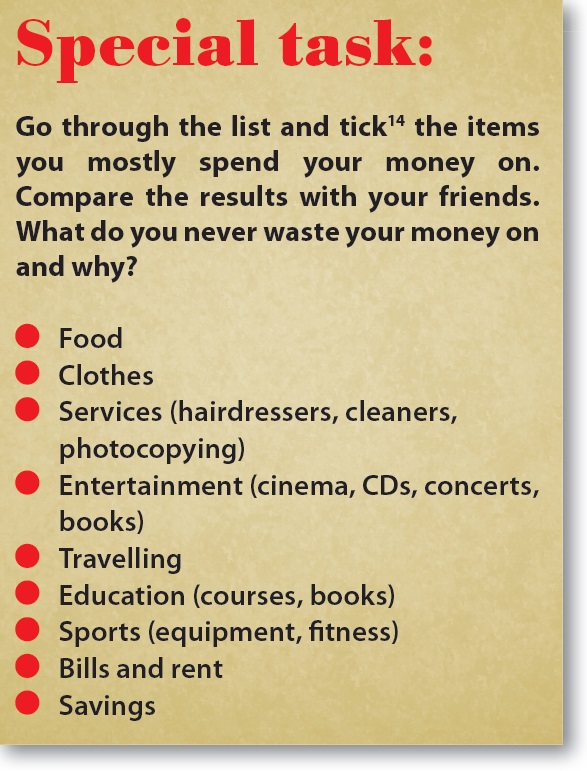It is said that money is the root of all evil. People want it even if they don’t actually need it, they often do crazy things to get it, and they fight for it and sometimes commit crimes to have it.
However, if we take a closer look, we find out that the coins and notes themselves are harmless1. It is human nature that makes money powerful. And so it is more precise to say that loving money is the root of all evil. Our relationship with money determines how materialistic we are; whether we are spendthrifts2 or scrooges3. We all need money to survive. The question is if we control it or if it controls us.
GETTING MONEY
The first contact with the world of money is made quite early when kids are given some coins to buy something. We all probably remember our first piggy banks filling with cash coming from our parents’ wallets and later on with birthday presents and pocket money.
It is great if parents not only provide their children with money but if they teach the little ones how to use it wisely as well. For example, it is good to encourage kids to save up to buy something. The child learns that money has some value and that it takes time, patience and sometimes even hard work to get what we want.
There are parents who prefer paying their kids for helping around the house so that they deserve their pocket money. However, this idea may have some negative impact too.
The kid may start to feel that nobody does something for nothing and may expect a reward for any kind of help.When the child is older, it is a great idea to encourage him or her to get a summer job to earn some money, even if the family is well-off4 and is able to support the child with money from the family resources. Young people must learn to be responsible and independent and not expect their parents to provide them with everything they want.
Stop to think :
Do you think it is better to give a child regular pocket money or to give him or her money only to pay for a particular thing?
Do you feel paying kids for housework is useful or harmless? Explain and add your own experience if any.
 SPENDING MONEY
SPENDING MONEY
Our attitudes to money vary and so do our spending habits. On the one hand, there are spendthrifts who enjoy squandering5 and do not care much about the value of their finances. Buying things is their passion, and they often go on shopping sprees6, wasting their money on stuff they don’t need at all.
On the other hand, there are scrooges who love saving up more than necessary. They hunt for discounts7 and bargains8 and rarely indulge9 themselves with some kind of luxury. Other people consider them mean10 and unlikeable; however, they have quite a high opinion of themselves and believe they are reasonable11.
We would probably agree on the fact that these are extremes and the best way of handling our finances is somewhere in between. Neither skimping12 nor frittering the money away13 is acceptable.
I’ve recently come across an interesting fact. One survey tried to find out which part of our brain is stimulated by money. The result was obvious: money stimulates our sense of security but never a feeling of happiness itself. You are all clever enough to draw the conclusion on your own.
Stop to think :
Do you consider yourself a scrooge or a spendthrift? Explain.
Do you prefer going shopping on your own or with friends/family?
Miroslava Dubanová
VOCABULARY: 1neškodný, nevinný; 2márnotratník; 3/skru:č/ lakomec; 4bohatý, dobre situovaný – bohatý, dobře situovaný; 5rozhadzovať – rozhazovat; 6nákupná horúčka – nákupní horečka; 7zľava – sleva; 8dobrá kúpa – dobrá koupě; 9dopriať si – dopřát si; 10lakomý; 11rozumný, uvážlivý; 12skrbliť – skrblit; 13rozhadzovať peniaze – rozhazovat peníze; 14zaškrtnúť – zaškrtnout

